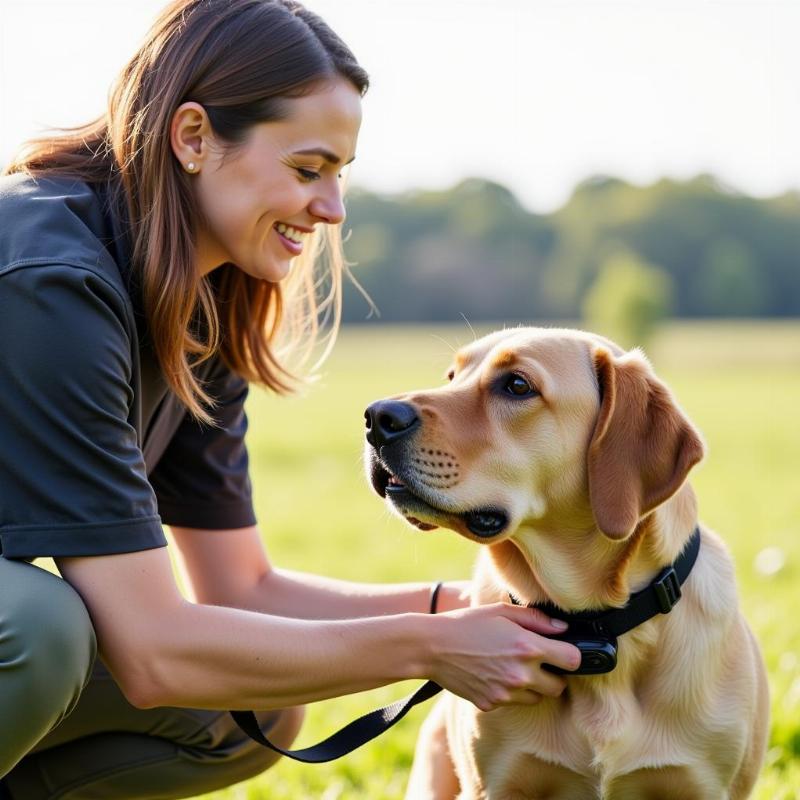Shock collars, or e-collars, are a controversial topic among dog owners. Understanding the appropriate age for e-collar training is crucial for responsible pet ownership. While some manufacturers may state an acceptable age as young as six months, many professional dog trainers and veterinarians in the US advise against using them on puppies younger than a year, and sometimes even older, depending on the breed and individual dog. The key isn’t just age, it’s developmental maturity and understanding basic obedience commands. Let’s dive into the complexities of using e-collars and explore safer, more humane training alternatives.
Choosing the right training tools and techniques plays a vital role in your dog’s well-being. While the question, “what age can you use a shock collar dog?” often arises, it’s essential to prioritize your dog’s emotional and physical development before introducing any aversive training methods. Using an e-collar too early can have detrimental effects on a puppy’s still-developing nervous system and can lead to fear, anxiety, and aggression.
Understanding E-Collar Training and Dog Development
Before considering e-collar training, it’s vital to understand how dogs learn and develop. Puppies, much like human children, go through critical developmental stages. Introducing an e-collar before a dog has reached sufficient emotional maturity can be counterproductive and even harmful. They need positive reinforcement and gentle guidance to build a foundation of trust and understanding.
The Risks of Early E-Collar Use
Using an e-collar prematurely can cause significant stress and anxiety. Imagine being subjected to a sudden, unpleasant sensation without understanding why. This can lead to behavioral problems, including fear-based aggression, and damage the crucial bond between you and your dog.
Alternatives to E-Collars for Young Dogs
Fortunately, there are many effective and humane training methods that are much more suitable for puppies and young dogs. Positive reinforcement, using treats and praise, is a highly effective way to teach desired behaviors. Consistency and patience are key, and building a positive relationship with your dog through reward-based training will create a much stronger foundation for future learning.
Positive Reinforcement and Building a Strong Bond
Positive reinforcement helps build a strong bond between you and your dog, creating a positive learning experience. This approach fosters trust and encourages your dog to want to learn, leading to a much happier and well-behaved companion.
When to Consider E-Collar Training (and When to Avoid It Completely)
Even for adult dogs, e-collars should only be used under the guidance of a certified professional dog trainer experienced in their use. They are generally considered a last resort for addressing serious behavioral issues, such as aggression or chasing cars, and are never appropriate for basic obedience training.
 Professional dog trainer using an e-collar
Professional dog trainer using an e-collar
“E-collars are powerful tools and should be used with extreme caution and only under professional supervision,” advises Dr. Emily Carter, DVM, a leading veterinary behaviorist in New York. “Improper use can lead to significant behavioral problems and even physical harm. Positive reinforcement methods are always the preferred first approach.”
Building a Positive Relationship with Your Dog
Training your dog should be a positive and rewarding experience for both of you. Focus on building a strong foundation of trust and mutual respect through positive reinforcement and consistent training. Avoid using aversive methods, especially on young puppies, and prioritize your dog’s well-being above all else. “Remember, training is not about dominance; it’s about communication and understanding,” adds Dr. Carter.
Conclusion
Addressing the question of “what age can you use a shock collar dog?” requires a deeper understanding of dog development and responsible training practices. While age is a factor, prioritizing your dog’s emotional maturity and utilizing positive reinforcement methods are crucial for their well-being. Consult with a professional trainer before considering any aversive training tools like e-collars, and always prioritize building a positive and loving relationship with your canine companion.
FAQ
- What are some alternatives to shock collars? Positive reinforcement training using treats, praise, and clicker training are effective and humane alternatives.
- Can shock collars harm my dog? Yes, improper use of shock collars can cause physical pain, burns, and psychological distress.
- At what age is it safe to start training a puppy? You can start training a puppy as early as 8 weeks old using positive reinforcement methods.
- Are there any breeds that shouldn’t be trained with shock collars? Dogs with anxiety or fear issues should never be trained with shock collars. Consult a veterinarian or professional trainer for advice specific to your breed.
- What should I do if my dog doesn’t respond to positive reinforcement? Consult a certified professional dog trainer to assess the situation and recommend appropriate training methods.
- Are there any legal restrictions on using shock collars in the US? While not federally regulated, some states and municipalities may have restrictions on the use of shock collars.
- Where can I find a certified professional dog trainer? The Certification Council for Professional Dog Trainers (CCPDT) is a good resource for finding certified trainers in your area.
Related Articles
- what if a dog eats a battery
- sit means sit dog training collar
- small dog shock collar remote
- why does my dog lick metal
- best hunting dog shock collar
Beautdogs.us is your premier online resource for comprehensive dog care information, breed-specific guidance, and access to the best products and services for your canine companion. Whether you’re a seasoned dog owner or just starting your journey, Beautdogs.us provides expert advice on training, nutrition, health, and overall well-being. We are committed to promoting responsible pet ownership and helping you build a stronger bond with your furry friend. Contact us for more information at [email protected] or call us at +1 501-555-7529. Visit Beautdogs.us today!